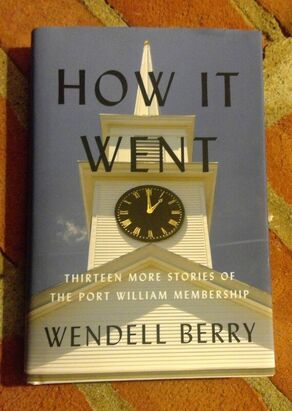 Driving down the road. Putting wet laundry in the dryer. Picking up a garden trowel. The quiet moment before falling asleep. A memory slips into your mind—their familiar whistle, particular look or smell, a phrase spoken…you remember and for a moment you re-member. The Port William Membership…if you don’t know what I’m referring to, it’s time to be introduced to Wendell Berry’s fictional town in Kentucky, its landscape and people. How It Went: Thirteen More Stories of the Port William Membership is his latest (and hopefully not last) book. I bought it for myself for Christmas and quickly read it, but like each of his Port William novels and short stories, they stay with me long after. Berry has a knack for describing the lived experience of the land and its people. Even if their particularities are not your particularities, you find yourself woven into their human experience. Stories of small town & farm-life, a barber and his shop, being a child or a parent during a world at war in the 1940s…they pull you in and draw you like a threaded needle into the fabric of your own life. With an ease that may surprise, you open your own memory box containing the people and places that have made you and many times, held you together. This particular book centers on an old man, a writer, looking back (like Berry himself). “Memories of times and places he had forgotten came back to him, reached him at last as if they had been on their way for a long time. He realized how fully and permanently mere glances, touches, passing words, from all his life far back into childhood, had taken place in his heart…” (p. 76). Andy Catlett remembers those no longer living and “yet by their absence his old companions have in a way come closer to him than they were when they were alive. They seem to involve themselves intimately in his life as he goes on living it” (p. 131). He sounds a lot like Saint John Chrysostom in the 4th century: “Those whom we love and lose are no longer where they were before. They are now wherever we are.” There are expressions of wit and wisdom that you have inherited. There are people whose presence, whether still with you in body or not, continue to bring comfort, encouragement, or perhaps curiosity! Pause for a moment:
___________________________ Just now as I finished writing, my son opened a can of sparkling water and the sound of his pouring it over ice took me back to childhood. I’m in 4th grade, pouring a cold glass bottle of Pepsi over ice and running it out to my mom who is push-mowing the front yard. I knew she loved the frothy fizz and wanted her to enjoy it that hot day. Although little fizz was left by the time she stopped and knelt down to drink it, I remember her look of appreciation, her joy in being remembered. To Get Started with Port William, look for these books: Jayber Crow Andy Catlett: Early Travels Hannah Coulter Nathan Coulter A Place in Time: Twenty Stories of the Port William Membership How It Went: Thirteen More Stories of the Port William Membership Kasey Hitt is a co-founder and instructor for Wisdom Tree Collective. She’s been a spiritual director since 2003 and has been reading Wendell Berry novels and poetry for just as long.
You can also find this blog and others from the Membership of Wisdom Tree Collective here. For some of us, Christmas is not experienced as "The Most Wonderful Time of the Year." For all who find themselves in this place, my husband, Russ, and I have offered The Longest Night of the Year Service on or around the Winter Solstice. A friend suggested it to us and after the first gathering in a small, country church over a decade ago, we knew it was something we wanted to continue. The service offers a safe space to acknowledge mixed feelings surrounding the holidays, to join together in lament and longing, and to simply step away from the rush of the season and breathe. Usually Russ offers only instrumental music during the short, 30 minute service but last year we offered the service via Zoom and he created a video with his only song with lyrics, "Some of Us," on his album, The Longest Night. Click on it below, listen and watch. Perhaps there's an image or lyric that connects with your own lament and longing, something that speaks to your soul. As to this year, we are offering the service online once again knowing more people can participate this way. I invite you to join me and a handful of others from Wisdom Tree Collective and Friday Morning Centering Prayer as we allow instrumental music, art from local/regional artists, laments and longings from Scripture, and Creation's own rhythm to companion us in the dark. Tuesday, December 21st 7:30-8:00pm CT Email me for the Zoom link. As I stepped on the shovel, I couldn't help but smile.
On Sunday, I joined other members from Wisdom Tree Collective as we partnered with Blessed Earth Tennessee, to plant 12 trees at Jones Brummett Elementary School. Why? Wisdom Tree Collective is a nonprofit that I helped co-found this year (after 3 years of planning!). My main branch of WTC is its School of Spiritual Direction and our very first cohort of students just started their third month of a 2-year online training program to become fulltime Spiritual Directors or bring a Spiritual Direction lens to their current callings. I continue to be amazed by those who are going through the program (from around Middle TN; Joplin, MO; and Tacoma and Seattle, WA) and the Spiritual Directors who are mentoring them! While it's a lot of work this first year, as I am developing both the content and rhythm, to say it's exceeding my expectations would be an understatement. Already I can tell you that I will whole-heartedly send people to each one of our current students for spiritual direction next year. Back to the trees... Part of Wisdom Tree Collective's commitment is to give back to the Earth by honoring our namesake and the ways we have experienced and continue to experience Divine Wisdom through trees. How have trees been a gift to you? Do you have any early childhood memories associated with trees? To read some of ours, go here. For every person who participates in our training program, classes, or retreats, we will plant a tree in their name. This year we planted 12 trees—9 for each of the students in the spiritual direction program and 3 on behalf of the 3 founders, the 6 spiritual direction mentors, and the Triune Dance of Love in which we find ourselves! And Heather Bennett of Blessed Earth Tennessee, found us the perfect location for our first tree-planting day—a brand new school in the Lebanon Special School District here in Wilson County, TN. She had no idea how much symbolism there was in planting trees around a new school's playground. As we dug the holes and planted the Sycamores, Sweet Gum, Tulip Poplar, Red Maple, White Oaks, Live Oak, and Southern Magnolia, I felt a sense of awe. Both of us are in our first year. A new elementary school has been planted in our community and trees have now been planted by the new Wisdom Tree Collective's School of Spiritual Direction. Looking up at the playground I smiled as I recalled all the times over the years I have talked about "the playground of God" or "the playground of the Holy Spirit" during classes and in spiritual direction. What a holy surprise! Clearly God was joining us in celebration on this crisp and sunny day! Are you interested in joining me for the 2022 fall cohort? The Certificate in Spiritual Direction Application can be found here. And be on the lookout for both online and in-person retreats and classes offered by Wisdom Tree Collective next year! By the way, if you're in the area, let me know if you drive by Jones Brummett Elementary and see our trees. ______________________________________ To learn more about Blessed Earth Tennessee, go here. And for more information about Wisdom Tree Collective, go here. 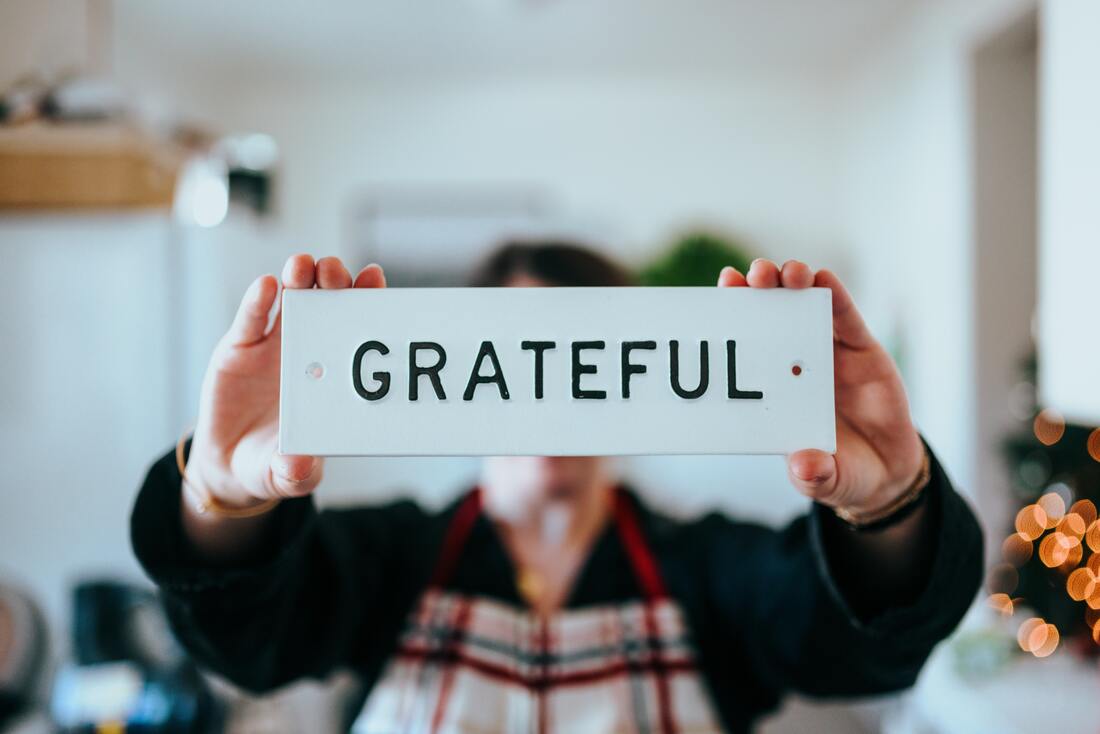 Photo by Nathan Dumlao on Unsplash Two people in my life are facing a terminal illness. And here’s what else they have in common: gratitude. Every time I talk to them, whether a simple conversation or in spiritual direction, I am amazed at the depth of their gratefulness. Their faces light up. It is like their diagnoses gave them new eyes to see life. And they are overwhelmed by the beauty right in front of them. Even more so, they are overwhelmed by the peace of God inside of them. The windows of their souls reflect it in such delightful ways. “Every day I wake up so happy!” one exclaimed to me (without a single relationship or situation changing in their life). How is this possible? Much of it is pure gift. Grace. And some of it, I am sure, is because both have done inner work in the years leading up to this moment. They learned how to listen deeply to God and how to listen deeply to others. They entered into meditation and mindfulness. They learned to play and be playful. They sought out spiritual direction and a precious few others to accompany them along their inner journey. Now their outer journey reflects what they cultivated within. Awe. Humor. Peace. Kindness. Joy. (Just to name a few) I am honored to be a witness. They are teaching me a lot. One of their gifts is reflected in the Sufi poet, Rumi's words, “I saw grief drinking a cup of sorrow and said to it, ‘Tastes sweet does it not?’ Grief confessed, ‘You’ve caught me and ruined my business. How can I sell sorrow when you know it’s a blessing?’” If you have no idea how sorrow can be a blessing and if you do not wake up happy, maybe it is time for an inner journey of your own. There is so much to be grateful for in this life. 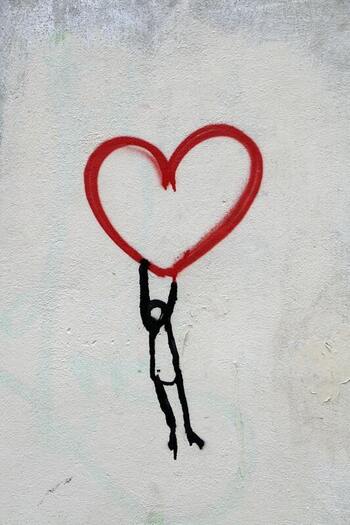 Photo by Nick Fewings on Unsplash Photo by Nick Fewings on Unsplash Living with tension in my chest has been a normal way of life for me for a long while. Feelings of heaviness, anxiety, pressure, and strain are familiar. Usually it is a manageable low-grade variety, but sometimes not. I have dealt with stress in my body for as long as I can remember—from intense stomach issues, headaches, and back pain that began in my early teens through late thirties to chronic hives and tension in my chest that is more prevalent now than the earlier symptoms of the previous decades. What I did not know then that I am beginning to know now is how hard my body has worked in order for me to move through life in productive and even life-giving ways. It has tried to control all the chaos, experienced and perceived, around and within, by holding it in different parts—the head, the stomach, the back, and now the heart. And what does this have to do with Spiritual Direction you might wonder? Well, the spiritual journey is one of giving up control! And that makes a body panic. Authentic spirituality will always lead to surrender and the body is most often the last to let go. Embracing a life of contemplation years ago with its practices of silence, solitude, and stillness has been transformative AND it has led me to this place of being on the brink of a deeper letter go. But first, in teaching me how to be present and not avoid reality, contemplation increased my tension and revealed an inner co-dependency. Weary of the increased tension, I began seeing a somatic therapist (someone who can help me better listen to the wisdom of my body, not just talk about my troubles). She also offers IFS. Internal Family Systems Therapy is a way of working with our internal parts or "family" so that there’s inner harmony rather than polarization and disharmony. I have found it so helpful over the years that I regularly incorporate it into Spiritual Direction with others. So during a session when I turned my attention to my heart, the heart responded with letting me know it was working really hard in “keeping it all together” on behalf of the rest of my body. How?—by consolidating all of the stress and strain into one area, holding it all in the chest…no wonder it felt heavy! As a Reiki Therapist (in addition to being a Spiritual Director), I know that the heart chakra normally filters what is being experienced but my heart was holding it all. Why? It did not want the other parts to feel the pain so it was “taking one for the team.” And the other parts were just fine with this co-dependent relationship. Even if a part was still hurting, it was willingly doing so. This is too common among mothers. Not long ago, I sat across from a mother and wife who has been doing the same thing for her family members. From an outsider’s viewpoint, it can be said that her fun-loving, spirit-lifting self, is the heart of the family. Being sensitive to her family members’ challenges and difficulties, she does her best through a variety of measures to help them not feel pain (or at least not as much), lest in her words, they “be destroyed.” Such a role can drain the light from one’s eyes, while also making it hard to see the co-dependency. Sometimes the only ones who can see clearly are the ones looking from the outside, noticing the absence of the eyes' light. They see the chaos and exhaustion and yet they have the least agency. For no matter how long or often another may see it, true "seeing" must come from within. In the session with my therapist, during a moment of silence, I remembered the painful interaction with my friend a few days before, and my heart said, “What you see in her is me.” Wow! I was surprised and then grateful for this insight. After expressing appreciation for the heroic ways the heart has expressed love for me, the therapist gently reminded this part that it’s easier to pick up a large weight with two hands rather than just one. She went on to say that in allowing other parts to feel the pain and chaos, the burden could be shared. My heart was skeptical but open. It saw and even named the co-dependency itself which meant it was ready for a change. But it still feared that in letting go, I would be destroyed—once again I would experience the searing nerve pain that led to emergency back surgery, the painful IBS that made for uncomfortable moments of dashing toward a restroom, the cancelled plans due to the need to be in a dark room for headache relief, or worse. It wanted to keep me from more of those experiences (and had been doing a pretty good job of doing so!). Yet I had sought help for the tension knowing that true freedom for one does not exist until there is freedom for all, whether in the outer world or inner world. So it began to relax and open in this safe space. And I began to feel the tension spread to my stomach, neck, shoulders, and head…oh no. Gently, I reminded my inner self that I was older now and had insights I did not have earlier in life. We were going to share the burden. And pain did not need to be the enemy. Guess what happened? Instead of being destroyed by the pain, the pain offered wisdom. In being dependent upon the wisdom of the heart, the other parts were sheltered. While this was okay for the short-term, it was unhealthy as a long-term strategy. Yes, different parts of me were not experiencing as much pain, but they were also not aware of the depth of their own strength and agency. “Kasey, when you feel your neck and shoulders get tense, it’s time to take a step back. You’re carrying too much on your shoulders,” the pain in those areas told me. Sometimes we need to step into what we fear may destroy us (or those we love, which is what we fear would destroy us). A spiritual director or therapist is often a wise (and usually a necessary) companion. Sometimes when we take that step, the tension increases. Looking back, the increased tension, even hitting "rock bottom”, is most often what leads to being given new eyes to see. Those new eyes to see help us navigate a new way to be. Next week: “How teaching on contemplative prayer actually encouraged inner co-dependency” Some Words for Those Who Won’t Listen (and for Healthcare Workers Who Are Exhausted From Shouting)8/18/2021
 Portrait of thoughtful nurse outside in PPE looking away from camera by Noun Project from NounProject.com Portrait of thoughtful nurse outside in PPE looking away from camera by Noun Project from NounProject.com “Wake up!” they shout. “Pay attention! Turn around!” These are words of prophets. And I have heard from three of them this week alone. With the shouting and weeping of Isaiah and Jeremiah, health care workers are sounding the alarm. Are we listening? They have the “inside scoop” of “reality as it is” rather than what we would like reality to be. COVID is not over. Social issues of the day and people’s selfish lack of response to them fired up Old Testament prophets. But their audience was a “stiff-necked people,” not listening to those who God was speaking through. These nurses and chaplain came to Spiritual Direction fired up about people’s lack of response to this social issue of our day. They are watching a preventable illness kill people of all ages while most seem to go on as though nothing is happening (or simply have decided to due to pandemic fatigue). The fruit of “false prophets” (like a pastor in my town who is preaching against and even punishing parishioners for wearing masks or the government and local leaders playing politics) is fear, division, isolation, hate, and death. They may speak the “right words” even use religious-sounding language, but “you’ll know them by their fruit” taught Jesus. The fruit of these health care prophets is lived-out compassion and the saving of lives. A vaccinated chaplain holds the hands of unvaccinated patients on the COVID floor of the hospital, putting her own and her young family’s health at risk to offer comfort. A nurse recovering from her own break-through case of COVID feels like she’s at the breaking point as she continues to tend to so many patients. A neonatal nurse watches as her pediatric hospital begins to fill and warns that the most vulnerable are suffering due to a view of freedom divorced from the common good. These health care workers are fired up with anger that shouts, “Something must change!” They are fired up…and they are exhausted. “Last year we were everyone’s heroes,” one told me, “this year we are ignored and at times even hated. I don’t understand. We’re seeing so much death and no one is listening to us, no one seems to care about us. Any cards of encouragement sitting around are from last year.” “I don’t know how long I can do this,” another said. It is time to stop dissociating. The path of and toward Life can be hard (& long) sometimes. But as my good friend, Linda says, “We do not do things because they are easy, we do them because they are important.” Listen to what the health care workers are saying is important. Here’s one right here in Tennessee. ____________________________ Now if you are a health care or front-line worker, an adult or child surrounded by people who refuse to heed the prophetic voices of our time, but prefer to “listen to what their itching ears want to hear” (see II Timothy 4:3), I want to offer some observations from a Spiritual Direction session this week. With her permission, allow these insights from a Florida chaplain of a big hospital to speak to you. First, let's begin with some Lectio Divina. Mark 4:35-41 35 On that day, when evening had come, he said to them, “Let us go across to the other side.” 36 And leaving the crowd behind, they took him with them in the boat, just as he was. Other boats were with him. 37 A great windstorm arose, and the waves beat into the boat, so that the boat was already being swamped. 38 But he was in the stern, asleep on the cushion; and they woke him up and said to him, “Teacher, do you not care that we are drowning?” 39 He woke up and rebuked the wind, and said to the sea, “Peace! Be still!” Then the wind ceased, and there was a dead calm. 40 He said to them, “Why are you afraid? Have you still no faith?” 41 And they were filled with great awe and said to one another, “Who then is this, that even the wind and the sea obey him? After listening to the story read to her three times, the chaplain spent time with two phrases she was drawn to: “On that day” in verse 1 and “the cushion” in verse 38. These details held precious wisdom for a way through this pandemic storm. Here is what she discovered:
 A "Simplicity" pattern came up when one person thought of the word "simplicity." What comes up for you? (find vintage patterns like this one at www.vintagepatternwarehouse.com) A "Simplicity" pattern came up when one person thought of the word "simplicity." What comes up for you? (find vintage patterns like this one at www.vintagepatternwarehouse.com) Sometimes the way we ask a question impacts how we answer it. My friend, Norman (from my blog last week), decided to continue to play with the words, “simplicity” and settling,” by sending an email out to friends and getting their responses. He received 18 replies! Norman asked them to consider “simplicity” and “settling” and respond first in a word or two, then in a sentence—what do they meant to you? Notice the way he took the same words and asked a different kind of question than I had at the beginning of this series of blog posts. He did not start with contrast as I had when I asked, “What do you think is the difference between 'simplicity' and 'settling'?” Instead, he presented them in a neutral way to call forth personal associations with each. Consider the nuance. The tone of my question (especially if you heard me ask it) leans towards “settling for,” rather than the state of “being settled.” His question left both possibilities open. Before you read some of the answers Norman received, take a moment to sit with his invitation to reflect on what “simplicity” and “settling” mean to you. What comes to mind when hearing each word?
Now here is a taste of the answers from this diverse group including professors, pastors, a women’s issues advocate, an engineer, world travelers, and more... Simplicity in a few words: Grace Least complicated Intuitively understood Peace Back to basics Settling in a few words: Resolved Established At peace with God Simplicity in a Sentence:
Settling in a Sentence:
Did you notice how he received more answers for the word “simplicity” than for the word “settling”? Why might that be? Perhaps the word “settling” is not as simple! May you, like Norman, reflect, play, and pray with these words (and invite others into the fun!).  Photo by Mariana Beltrán on Unsplash Photo by Mariana Beltrán on Unsplash I asked my dear friend, Linda, what she thought the difference between "simplicity" and "settling" were and her answer surprised me. "Simplicity asks, 'What do you truly want?''" She went on, "With settling, I may settle for what I don't want and since it's not what I want, I keep looking for it.'" Then she shared an example from her own life. Many years ago, a woman asked if she wanted a certain set of dishes for her wedding and if she did, this woman would buy them for her. She really did not want them, but she felt uncomfortable saying "no" so she received them as a wedding gift. Since she had them and could get more pieces to match, she expanded her collection of dishes she did not want but settled for. But she noticed something. Whenever she was at a store that sold dishes, she looked at the patterns. Years of time and energy were spent on looking for dishes when she already had a full set! Her longing was left unsatisfied because she had settled so many years ago, afraid of offending the gift-giver. Now having retired, she decided it was not too late and she knew what she wanted. Much to the surprise of her family (who never knew she did not like the dishes!), she decided to box up her collection and put them for sale on a neighborhood social media site . Then she went out and bought the dishes she truly wanted, a beautiful butterfly pattern. Another woman happened to see the dishes she had for sale and was overjoyed for she had been looking for those exact dishes because they reminded her of her mother! Both were full of joy and satisfied with their purchases. Guess what happened after that? My friend stopped looking for dishes! We went on to talk about how we tend to buy things that are only on sale or we get what is cheap because we can have "more" of the item. Sometimes this is okay, but when it becomes a pattern, our collection of unwanted, unused stuff grows along with our dissatisfaction which compares and wants more. What do you truly want? It can be a difficult question. We need to stop and think rather than compulsively or fearfully say "yes" to what we do not want (or allowing others to decide for us or think we should want what others have). Jesus often asked people like blind Bartimaeus, "What do you want me to do for you?" It's not that Jesus could not see what Bartimaeus wanted, He wanted Bartimaeus to "see" and say for himself! It is a simple question. Yet answering honestly may just simplify the amount of internal and external stuff that becomes a burden--now that's a gift! 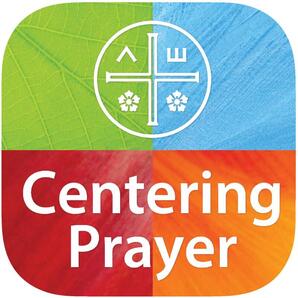 https://www.contemplativeoutreach.org/ centering-prayer-method/ https://www.contemplativeoutreach.org/ centering-prayer-method/ While they may share silence and look the same on the outside, join me in taking a look on the inside… Different forms of meditation offer the practitioner different gifts depending on their focus. Some of these forms and gifts are mindfulness, movement, awareness, breathing, insight, chakra-opening, loving-kindness, relaxation, guided, calming, and creativity. As one who meditates, I appreciate and practice a variety of methods and even combine some, but I call Centering Prayer my main practice. However, many do not understand how Centering Prayer offers anything different from other forms of meditation. Centering Prayer was developed by Trappist monks, Fathers William Meninger, Basil Pennington and Thomas Keating, to help bring the ancient practice of contemplative prayer within the Christian tradition to people outside the monastery—which is most of us! Inspired by early Christian contemplatives and the medieval text, The Cloud of Unknowing, their process—20 minutes of silence once or twice a day—allows the power of and presence in Silence to be accessed by those of us who live in the “world of words.” This prayer’s nickname, the "Prayer of Consent," reveals how it differs from other forms of meditation. Rather than focusing solely on being present to sounds and sensations or giving the ego mind something to do like count, follow our breath, or say a mantra, Centering Prayer’s sole focus is surrendering. We consent to the presence and action of God within us. During the 20 minutes of sitting comfortably, but alert, with head up and eyes closed (or with a resting gaze toward the floor), we introduce a “sacred word” as a symbol of our intention to consent. This can be a word like “Peace,” “Jesus,” or “Love.” Whenever we become aware of our mind being engaged with thoughts (no matter how interesting or enlightening!), we simply and gently say our sacred word. We come back to surrendering all—every plan, worry, person, to-do list, dream, ah-ha, observation, insight…you get the idea. We let go of everyone and everything, trusting God with and for all. Given the focus is learning to trust God, it does not matter how many times we catch ourselves wandering and returning. Every instance is an opportunity to “come home” and trust the Beloved with each. Some days we will find ourselves saying our sacred word quite often, for we may have more weighing on our hearts, minds, and bodies than other days. Notice how relational Centering Prayer is! It can certainly expose an unhealthy image of God which may be why a part of us rightly refuses to surrender! To explore that being a possibility rather than the normal ego tantrum of giving up control, go here. How we enter into Centering Prayer can help us consent. We see a model for this powerful and humble consent in Jesus, especially in the Garden of Gethsemane after asking to be spared from suffering but willing to surrender anyway. His deep trust in the Heart of God leads him to say what he taught his disciples to pray, “Thy will be done.” Jesus’ response echoes the words of his mother, Mary, after being told she would bear the Messiah. To this overwhelming and possibly dangerous news, she says to the angel bringing her the announcement, “Let it be done unto me according to Your Word.” Perhaps Jesus learned his prayer of surrender from her! Every time we enter into Centering Prayer, we join Mary and Jesus in this powerful, humble, and holy consent. For twenty minutes, we practice releasing our grasp on our plans, desires, abilities, and attachments. After coming to an end of our own words in prayerful petition, no matter how a situation may look to us (and others) on the outside, we trust in the presence and work of the One who dwells in secret on the inside. Try this:
*Contemplative Outreach offers an app with a timer and ways to enter into and end your time of Centering Prayer. And no matter what level of experience you have, you are always welcome to join me for communal Centering Prayer every Friday morning from 9:00 AM- 10:00 AM (Central Time Zone). Contact me for the Zoom link.  This may be figurative for you as in, “There’s no going back to church as it was before the pandemic.” Or it may be literal, as in, "I'm not going back…period." I have heard both. Pastors and parishioners come to spiritual direction wrestling with what the future looks like for their particular church and the Church as a whole. Others come with the discovery that church attendance was part of a checklist they found relief from during the pandemic when it was no longer something they “had to do” because they couldn’t do it! But things are beginning to open up. As more people receive vaccines and mask-mandates are lifted, some are feeling a growing pressure to figure out what they’re going to do when it comes to church (this includes pastors!). Some tell me how much they miss being with their congregation and cannot wait to go back to in-person worship without the worry of virus spread. While these folks have regularly tuned-in to online worship, just thinking of returning to the building brings joy. It will be a type of homecoming to a family and place they long to see and be. Yet this is not the sentiment of everyone. Two months into the pandemic, a long-time church-goer said to me, “It’s astounding how little I miss church. That's definitely saying something to me.” This person regularly comes to spiritual direction and regularly helps those in need, yet they have experienced a growing disconnect with their church over the past few years. The pandemic only heightened, or brought to the surface, what was covered by obligation and comparison. While those around them seemed to be enjoying and feeling nourished by the Sunday morning service, everything felt forced and inauthentic to them. In spiritual direction they recalled continuously leaving spiritually starving and angry. They recounted every positive-thinking, heart-opening spiritual practice they have tried…and nothing changed. Their discontent and disgust just grew. The pandemic was in some ways a grace, offering a break from the inner turmoil of whether they should stay or leave. Overly-simplistic truths like “Church is the people not the building” offer little help because church and church-going can be complicated depending on one’s personality, childhood, personal beliefs, and present experience of church-going and church-people. I know this, because I, too, have wrestled for decades, and continue to wrestle, with all that is intertwined with church/Church. It’s been a long, liminal space for everyone. This threshold, or in-between time, can lead to deep questions or the acceptance of a clarity that has been clouded over by a sense of coerced duty and/or loyalty (whether the pressure comes from within or without). Could leaving church actually be a sign of spiritual growth? It just may be. My directee craves more than their congregation can offer. They want to go places theologically and spiritually their congregation is unwilling—perhaps unable—to go. Conversations have failed to lead to Shalom (peace and wholeness). Even after many years, they may need to heed Jesus' call in Matthew 10, to “shake the dust from your feet” and leave. No need to demonize the pastor or congregation, it’s simply time to move on and continue one’s journey on and toward the path of Life. It’s not easy. There’s no one-size-fits-all way of leaving a place and people one had hoped would be life-giving. It requires a lot of trust. As my directee has wrestled with their discernment, I have never given them reasons to stay or leave or suggestions on how to stay or leave. I just listened. Ways of wisdom always arise as we release our stranglehold and wait for God's guidance (for the Holy Spirit is the true Spiritual Director, after all!). So whether you are joyfully anticipating resurrection through returning to a beloved congregation or grieving the realization that you need to let something die for belovedness (including beloved community) to be born again, spiritual direction is a safe place during the in-between. In spiritual direction, you will find permission to let your own inner wisdom be your guide. Allow the feelings of pressure and dread to speak. Listen to what your body has to say. Pay attention to the images your soul is offering. Become aware of patterns in the ways God has been at work in your own life story. For God has been and always will be fully present to you and in you. The fullness of God's presence is equally with the person who worships in a church building (with 15 or 5000 people) as with the person who worships in ways that do not include a church building and its congregation. To a group of young men, 13th century mystic, scholar, and Dominican priest, Meister Eckhart, said: "Whoever truly possesses God in the right way, possesses him in all places: on the street, in any company, as well as in a church or a remote place or in their cell…” (Walshe, 2008, Talks of Instruction, 6). He also once said, Some people prefer solitude. They say their peace of mind depends on this. May the wisdom of Meister Eckhart give us the boldness to listen to our own—and to stay and leave as the Spirit beckons.
|
AuthorKasey is a scarf, ball and club juggling spiritual director just outside of Nashville, TN. Play helps her Type-A, Enneagram 1 personality relax, creating space for poetry and other words to emerge. She also likes playing with theological ideas like perichoresis, and all the ways we're invited into this Triune dance. Archives
January 2024
Categories
All
|
By clicking “Sign up for E-News” I consent to the collection and secure storage of this data as described in the Privacy Policy. The information provided on this form will be used to provide me with updates and marketing. I understand that I may modify or delete my data at any time.
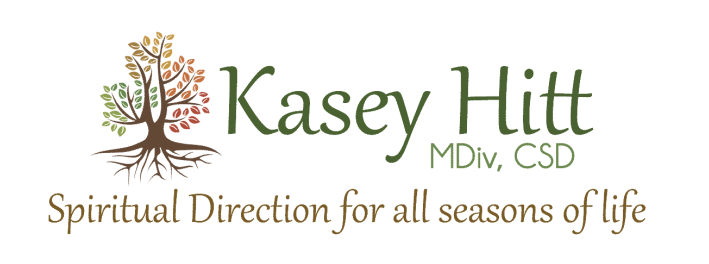
 RSS Feed
RSS Feed

